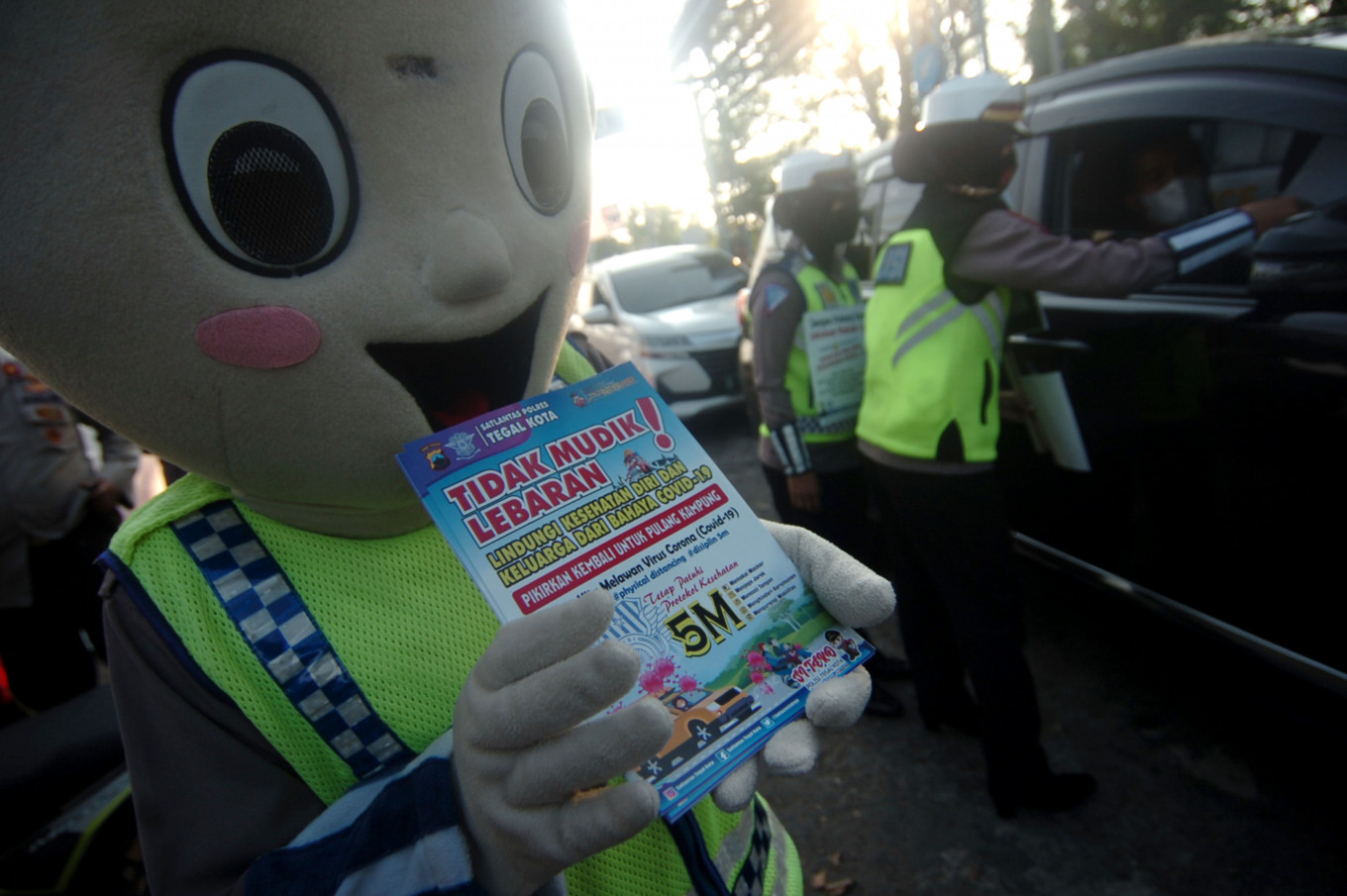Bracing for the next wave
The deployment of police on roads leading out of major cities creates the impression that the policy discriminates against the poor.
Change Size
 A costumed police officer displays a leaflet discouraging people from participating in the Idul Fitri tradition of ‘mudik’ (exodus) because of the risk of COVID-19 contagion, in Tegal, Central Java, on April 26, 2021. (Antara/Oky Lukmansyah)
A costumed police officer displays a leaflet discouraging people from participating in the Idul Fitri tradition of ‘mudik’ (exodus) because of the risk of COVID-19 contagion, in Tegal, Central Java, on April 26, 2021. (Antara/Oky Lukmansyah)
T
he government is overwhelmed in stopping the flow of city folk leaving town for their home villages to celebrate Idul Fitri, the end of the Ramadan fasting month, which falls next Thursday. In spite of a ban on mudik, as the annual exodus is called, many people find ways to beat the system.
Police may have forced busloads and carloads of people back to town, but there are stories of revelers finding alternative routes. Others made the journey before May 6, the start of the official ban, or plan to make the journey after May 17, when the ban ends. This forced some local authorities to start imposing the ban as early as April 22.
This is a poorly thought out policy. The deployment of police on roads leading out of major cities creates the impression that the policy discriminates against the poor. The wealthy do not face so many restrictions flying. This sense of injustice contributes to the defiance by the poor people determined to celebrate Idul Fitri at home.
The government faces another challenge dealing with Idul Fitri mass prayers next week. Jakarta Governor Anies Baswedan says people can hold the prayers in open fields but must observe the health protocols. The COVID-19 task force says open field prayers are banned in districts designated black or red COVID-19 zones. Religious Affairs Minister Yaqut Cholil Qoumas says people should pray at home, stressing that taking part in mass prayers is not mandatory in Islam.
These conflicting statements do not bode well for the credibility of the government and has repercussions on how seriously the public take COVID-19 warnings and policies.
In many ways, Indonesia is replicating the Indian tragedy, where there has been an explosion of COVID-19 infections and deaths this past month. India relaxed the health protocols in January and allowed religious events and holidays with mass gatherings to take place. The discovery of a more maligned variant of the virus in the country made the already bad situation worse. Some Indonesians have tested positive for the Indian variant.
President Joko “Jokowi” Widodo has made several televised appearances appealing to people to refrain from going on mudik and to celebrate at home. He has also invoked the Indian tragedy to warn that something like this could happen here if people defy the mudik ban. He said the COVID-19 infection rate had spiked after each long holiday in the past year — last year’s Idul Fitri, the holiday around Independence Day in August and the long Christmas-New Year break.
Jokowi’s personal appeal and tough police enforcement have not stopped the mudik flow. It is not too late, however, for the government to come up with clear guidelines on Idul Fitri prayers, which could potentially be the next big clusters. But we need a tougher and credible regulation, applied to all rather than selectively. And make sure everyone speaks the same language.
Otherwise, we should brace for the next wave of COVID-19 after Idul Fitri. If we are really replicating the Indian mistake, the next wave will be devastating.









